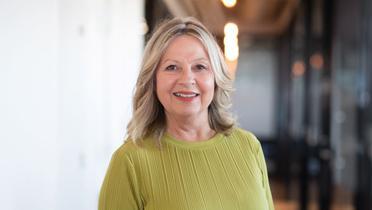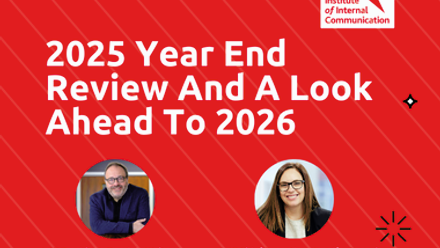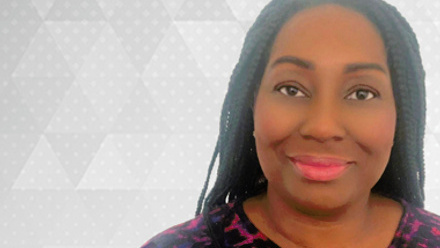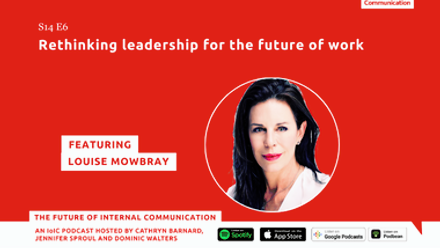'Internal comms needs to utilise its unique position in organisations'

When Suzanne Peck was six, the IoIC president and managing director of employee engagement agency Sequel Group aspired to be Jane Bond, the first female spy (“I wrote the name in most of my books!”). But that planned career in espionage switched dramatically when she was 12, when she decided she wanted to be a journalist.
“I don’t know where it came from, but I always loved writing,” she considers. “Watching the news at 6pm each day was a big thing in our household, and I was a voracious reader.”
Despite having an offer of a university place to read English, Suzanne got an apprenticeship on a local newspaper. “Why would I go to uni if I could start being a journalist straight away? I loved it. I learned so much.”
After five years in local papers, a move to London and three months with The Daily Mail burst the journalism bubble. “There was a sense of ‘I don’t really care about you or what you have to do to get a story – just get it.’ It didn’t match my own values.”
A job advert in The Guardian to work in the press office at Marks & Spencer jumped out and Suzanne got the job – but she realised after a few weeks that life in a press office also wasn’t for her.
“I felt like I was spending a lot of time finding ways to say ‘No comment’,” she recalls. “But across the corridor was the internal communications team.
“What drew me was that they were out across the business, talking to a much wider range of people. M&S had over 75,000 staff, a monthly 16-page newspaper and a quarterly magazine, so there was more opportunity to be involved.”
Fortuitously, a vacancy soon came up and Suzanne “fell into IC across the corridor”.
What do you recall about internal communication when you joined M&S in the 1980s?
I was lucky, because I know my experience of IC at that time was perhaps different to other people’s. At M&S, I felt employee voice was respected and considered. Back then, the firm was family-run and I distinctly remember that sense of community and care permeating through the business. There were feedback schemes and employee forums as well as a clear link between performance, great work and being rewarded, whether you worked in stores or in HQ.
On the employee newspaper, we were encouraged to find the human interest behind the stories – the person who created the technology in a new range of tights, or the thought process behind the opening of a new store. It was based on data and market analysis, supplier partnerships and communication, and sales. I developed an understanding of all the large and small cogs that worked together to make a successful business.
What skills from newspaper reporting did you bring into internal comms?
I consider myself to be quite nosey! That curiosity – being interested in people and the why – is important. As a journalist, you’re trained to not be the story and to be impartial, cutting through jargon or spin. In internal communication, we too are the narrator and shaper of information. We’re trusted to find evidence and facts, and to then craft readable and relevant stories that appeal to our audiences.
After another in-house IC role with construction firm Alfred McAlpine, you moved agency-side, where you’ve been ever since. What do you love about agency life?
I’ve been lucky to work for, and with, several inspiring, visionary and talented people. I’m not often the cleverest person in the room, and that’s how it should be – surround yourself with brilliant-minded, creative people who are better than you!
In an agency, the work is also diverse. No two days are the same, no two clients are the same. I learn a lot from working across many different industries. It’s satisfying to get under the skin of a business and to then come up with ideas and solutions that deliver results.
How can in-house IC practitioners get the best value from agencies?
Give the agency the freedom to share their experience. Most clients ask, ‘What are other leading organisations doing?’ Work with us because you are open to ideas and a shared insight into what worked – and what didn’t. Use our knowledge and creativity. You might think the answer is a shiny new app, but we can offer other ideas and ways to engage audiences.
Do you think storytelling is still a strong focus in IC?
Storytelling is a cornerstone of employee engagement, but personally, I wonder if we are in danger of losing this skill. Is it because we are not curious enough about our organisations? Is it because we’re losing the skill of recognising what makes a good story? Is it because we’re so short of time with the multi-channels and tasks we have?
In any organisation, the stories are there, but we need to identify them and then use our talent to decide what’s important and relevant, as well as the best way of sharing them. AI can’t do this human intelligence as well as an experienced communicator who knows what matters to their audience.
Are there any areas where you are frustrated by IC’s lack of progress?
One of my favourite quotes is, ‘Without data you are just another person with an opinion’ and it feels like we have been talking about measurement in internal comms for so, so long! Measurement proves our worth, it informs decisions and shapes strategy and impact, and yet we are still struggling to weave it effectively into our work. One day we’ll crack it.
You’ve been a long-time member of IoIC or, as it was known when you joined, the British Association of Industrial Editors (BAIE). Why was this important for your early career?
My manager at M&S recommended I join BAIE in the 1980s. In my work, I’d felt isolated. I had no idea if other internal communicators had the same experiences.
I went to my first BAIE conference in Torquay and – bingo! – I found my tribe and made what would turn out to be lifelong friends. I had the opportunity to learn about IC best practice, and to talk to like-minded people about their work and challenges.
When I was elected to BAIE’s governing council, I was in awe of some of the more experienced council members. Their depth of knowledge, generosity in sharing insight, and passionate debate and decision-making for our growing profession opened my eyes to the difference great IC can make to an organisation.
How did you end up as president?
I’m a believer that you get out what you put in. I’d been involved with BAIE, then Communicators in Business as a volunteer for more than 25 years by the time I became president. I’d worked on committees, then stood for council, I’d headed up the conference and awards committees, and then I was asked to stand for chairman.
The chairmanship changed every two years in those days. As my term was up, Alan Peaford, who was then president, stepped back and it felt a natural next role for me. Back then, there was little to no job description for the president, so I took what there was and shaped it into what I felt I could bring as president: governance, strategic direction and priorities, and support and wider advocacy for IoIC.
What makes you proud of IoIC?
There are so many things! The breadth and depth of what today’s Institute offers its members; the many opportunities for learning and for professionalisation through qualifications; and our robust awards programme so that we can identify, share and better recognise great IC practice.
Then there’s the factsheets, guides, webinars, podcasts and resources that help modern communicators with far more than the practical skills, widening understanding of issues like harnessing AI, the changing workplace, speed of technology change and wider societal issues that impact the working environment. And we’re growing membership – we have 2,500-plus members!
Finally, on my shortlist is the IC Index report, which was launched last year – a long-held ambition to share such groundbreaking and evidence-based knowledge that’s of real value for today’s communicators, and their organisations.
What does the future hold for internal comms and IoIC?
Our world and workplaces are constantly changing and IC has to be resilient and flexible to match that pace of change. We’ve experienced the great IC reset after the pandemic. IC proved its value, but we have to keep proving this over and over again.
A fellow member said to me a few weeks ago that post-pandemic, the shine of IC was starting to dull and I felt this was such a great way to express the need for us to keep polishing.
We need to realise and utilise our unique position in organisations. We’re the only role that has free access to people at all levels of a business. I liken us to an amoeba as we can shapeshift and get into the different nooks and levels of an organisation, to listen and to then share what’s important and relevant to improve our organisations.
Meanwhile, for IoIC, we’re fortunate to have such a visionary CEO in Jennifer [Sproul] and a super tight HQ team that does so much with so little resource. I’d also love to see continued investment in HQ so that the team can keep delivering what members want and need to grow.
In conclusion, why do you love your job in internal comms?
I think I have always just been interested in people, in talking to them and understanding what gets them out of bed in the morning, what interests them, what drives them. I would definitely have made a good spy!
Internal comms has never felt fluffy or gratuitous to me. We’re not just telling the story of Rose from the canteen; we’re explaining why what she does is important in the bigger picture, how her contribution makes a difference to other people, and then to the business, and why engagement helps her to be more productive. We’re the connector in that chain.
It’s always felt a privilege to be in internal comms and, even after almost 40 years in the industry, I still feel lucky to have found my tribe when I did.






